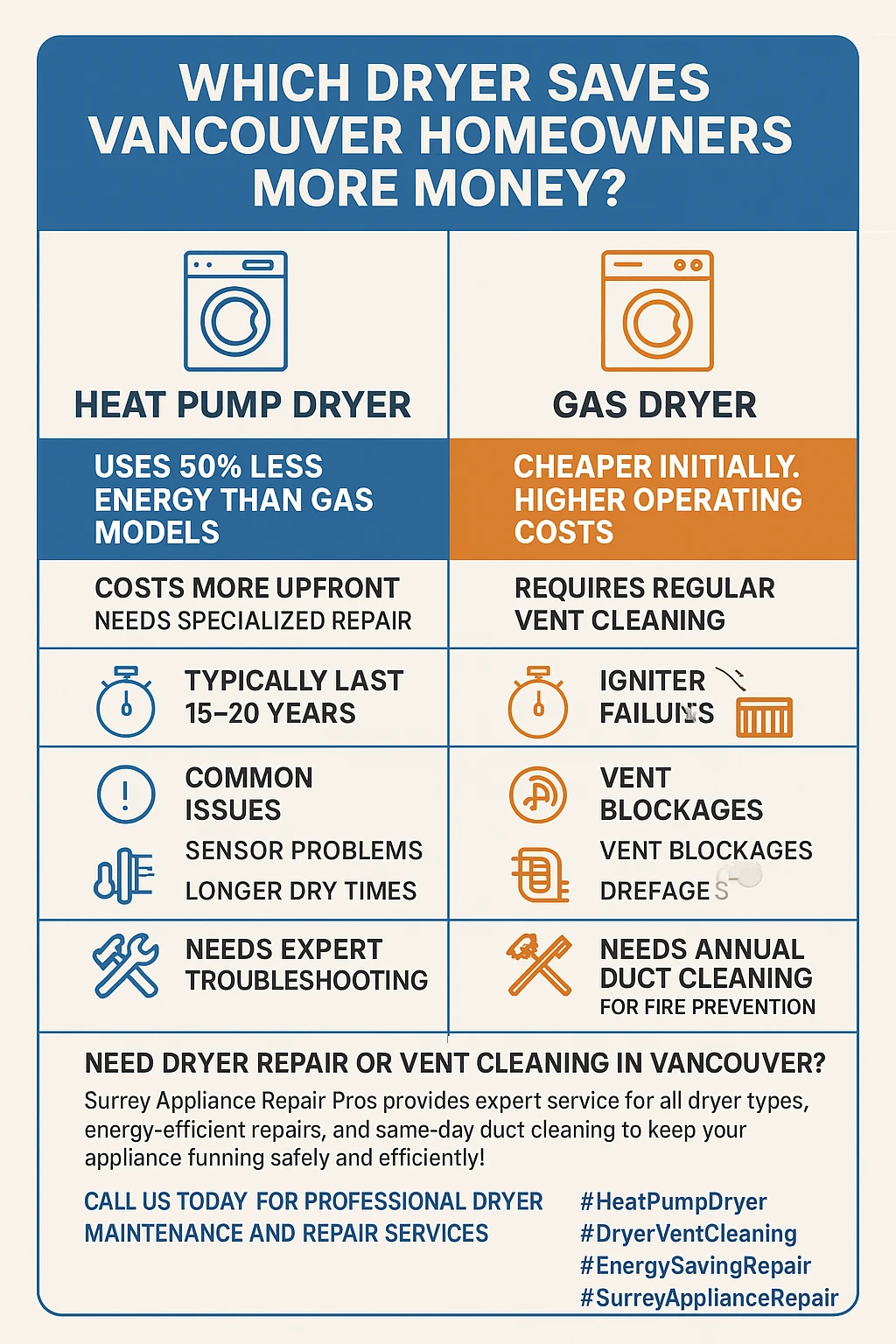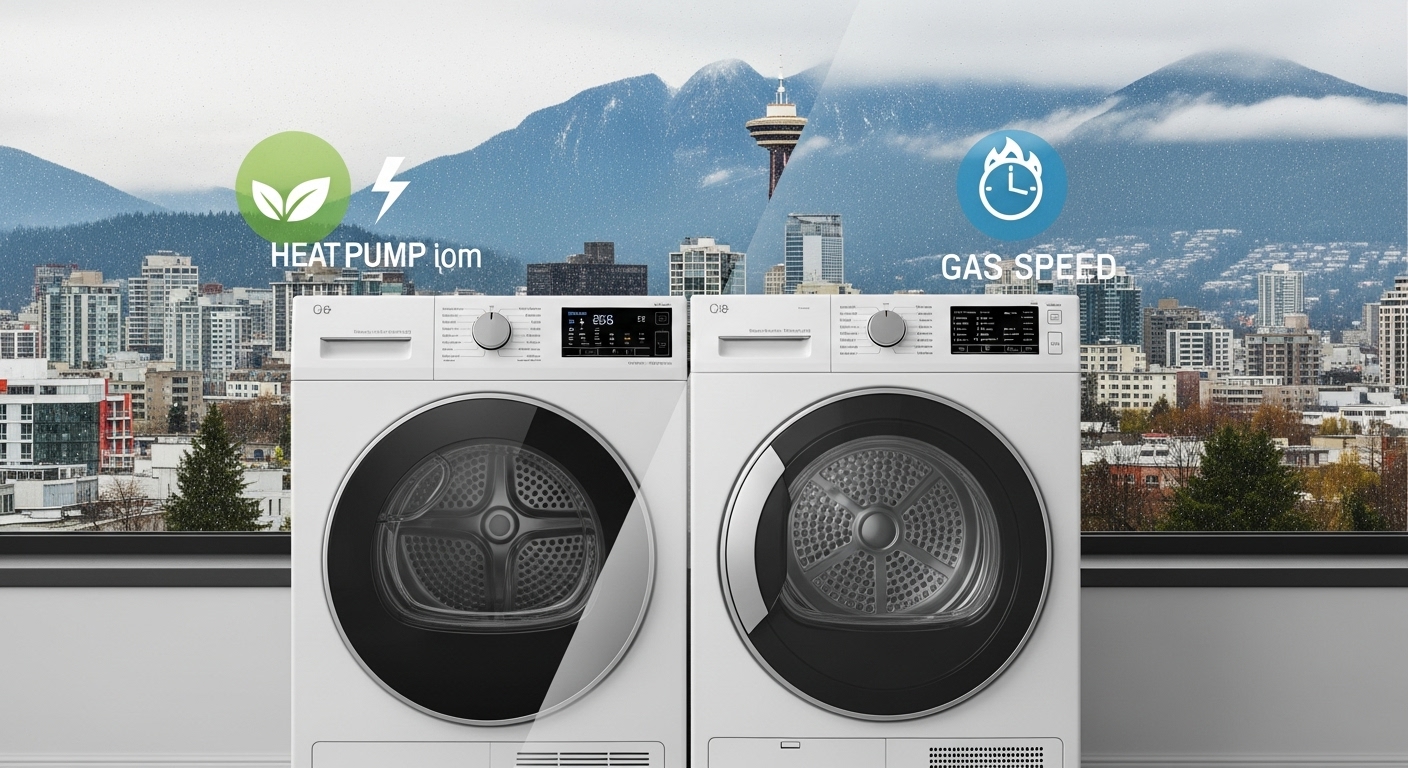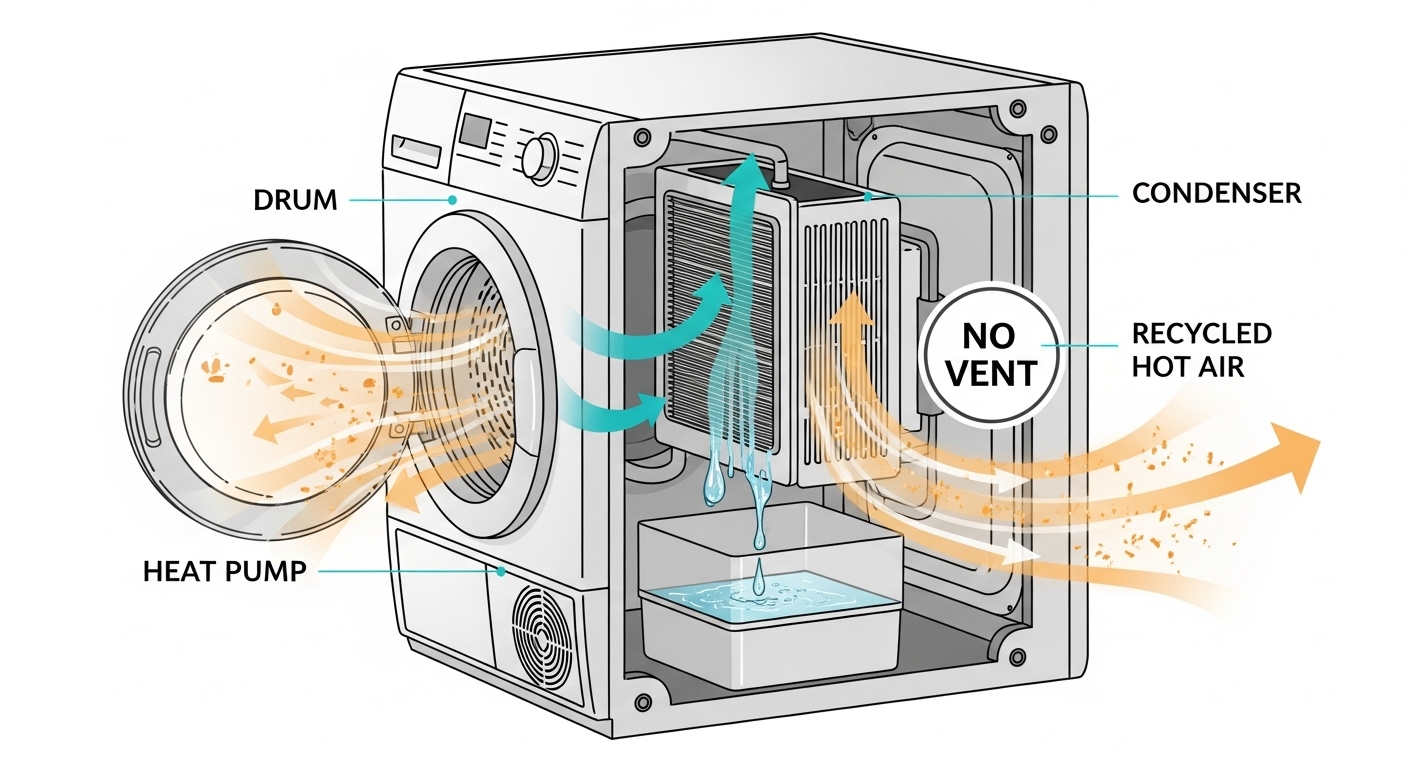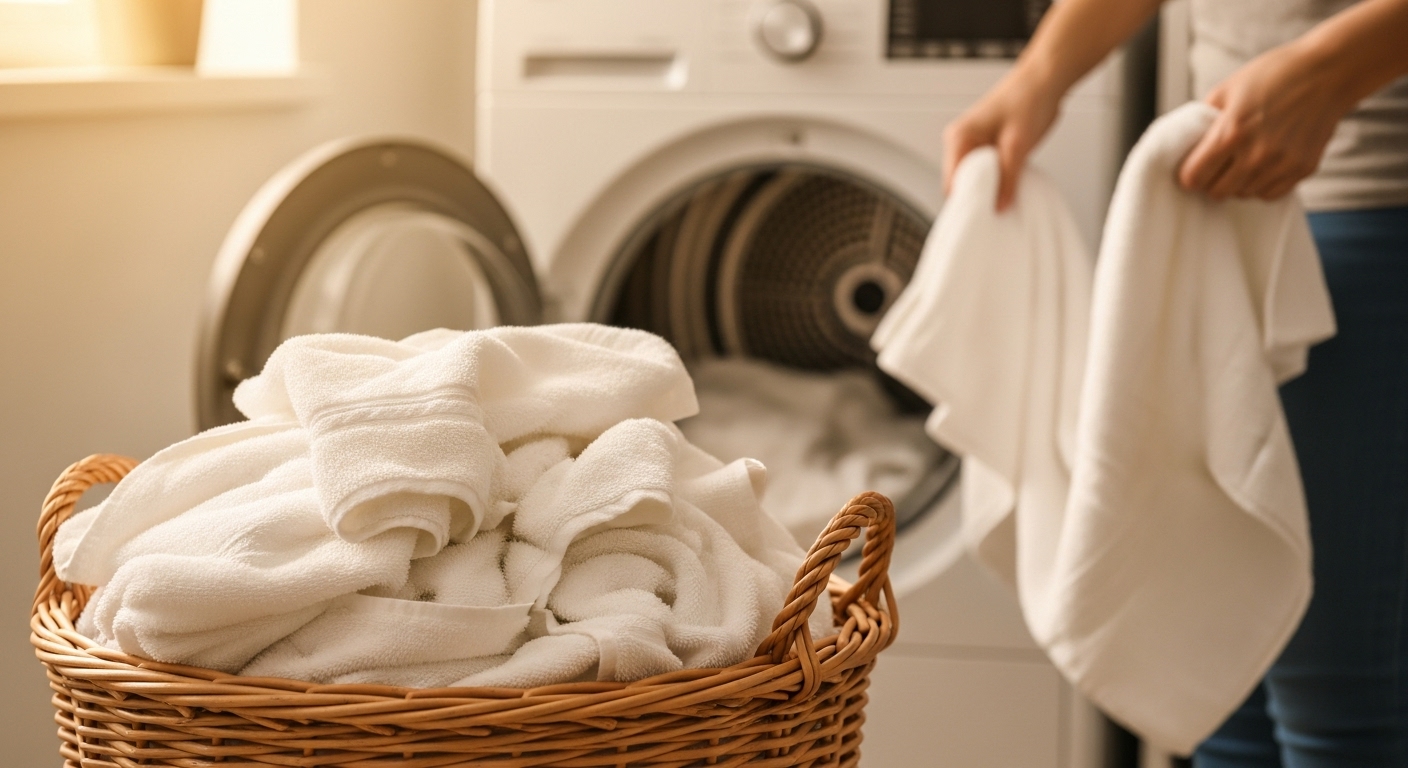Heat Pump vs Gas Dryer: Which Saves Vancouver Homeowners More Money (And When Each One Breaks Down)
Trying to decide between a heat pump and gas dryer for your Vancouver home? We’ll break down the real costs, energy savings, and maintenance headaches so you can make the smartest choice for your laundry room and your wallet.
Let’s be real – laundry is one of those adulting tasks that never stops coming, especially here in Vancouver where the rain seems to follow us indoors half the year. And if you’re staring at your old dryer making that weird clunking sound again, you’re probably wondering whether to go with a sleek new heat pump model or stick with the tried-and-true gas option. Trust me, I’ve been down this rabbit hole myself, and the answer isn’t as straightforward as you might think.
The thing is, Vancouver’s unique climate and energy costs create a pretty specific set of circumstances that can make or break your dryer investment. We’re dealing with some of the highest humidity levels in Canada, energy rates that seem to climb every year, and a housing market where half of us are living in condos with shared laundry setups. It’s like trying to solve a puzzle where the pieces keep changing shape.
After diving deep into the numbers and talking to local repair techs who’ve seen it all, I’ve put together this comprehensive breakdown of what really matters when choosing between heat pump and gas dryers in our neck of the woods. We’ll cover everything from those sneaky operating costs that add up over time to the repair bills that can hit you out of nowhere.
Key Outtakes:
- Heat pump dryers use 40-70% less energy than conventional dryers but cost $500-$1500 more upfront
- Gas dryers dry clothes in half the time and have lower operating costs due to cheaper natural gas prices in BC
- Vancouver’s average 73% humidity increases energy consumption for both dryer types by up to 50% during our rainy season
- Heat pump dryers don’t require exterior venting, making them ideal for Vancouver condos and saving $150-$300 in installation costs
- Repair costs vary significantly: gas dryers typically cost $150-$400 to fix while heat pump models range from $199-$499

Understanding Vancouver’s Unique Laundry Challenge
Before we dive into the nitty-gritty of dryer comparisons, we need to talk about something that makes Vancouver different from pretty much everywhere else in North America – our climate. Living here means dealing with humidity levels that would make a Floridian sweat, especially during our October-through-March rainy season. I learned this the hard way when I moved here from Calgary and suddenly my clothes were taking forever to dry.

Our average humidity sits at around 73%, but during those dreary winter months, it can spike to 88%. What does this mean for your dryer? It means both heat pump and gas models have to work significantly harder to pull moisture out of your clothes. We’re talking about a 50% increase in energy consumption during peak humid periods. That’s like your dryer suddenly developing a serious case of the munchies for electricity or gas.
Then there’s the reality of Vancouver housing. If you’re in one of the countless condos dotting our skyline, you’re probably dealing with shared venting systems that require strata approval for modifications. I’ve seen neighbors wait months just to get permission to update their dryer setup. Meanwhile, if you’re in an older house, you might be looking at significant costs to run new gas lines or upgrade electrical systems.
The other piece of this puzzle is our energy costs. BC Hydro’s residential rates start at 11.72 cents per kWh for Tier 1 usage, jumping to 14.08 cents for Tier 2. Meanwhile, FortisBC keeps natural gas relatively affordable at $2.230 per gigajoule. These rate structures can dramatically impact which dryer type makes financial sense for your household, especially when you factor in how much laundry you’re actually doing.
Heat Pump Dryers: The Energy-Efficient Newcomer
When I first heard about heat pump dryers, I thought it sounded like someone was trying to reinvent the wheel. But after digging into the technology and seeing the numbers, I have to admit they’re pretty impressive. These machines work like a mini air conditioner in reverse, recycling hot air instead of constantly heating fresh air from scratch.

The magic happens in their closed-loop system. Instead of yanking air from your laundry room, heating it up, and then blasting it outside (taking your hard-earned heating dollars with it), heat pump dryers capture that warm, moist air and run it through a condensing system. The moisture gets collected in a tank or drained away, and the dried air gets reheated and sent back into the drum. It’s like having a really efficient conversation instead of shouting into the wind.
From an energy perspective, these units are absolute champs. We’re talking about using only 40-50% as much energy as conventional dryers, which translates to some serious savings on your BC Hydro bill. ENERGY STAR certified heat pump dryers can save more than $500 in electricity costs over their lifetime, and that’s using average North American rates – our BC rates make those savings even more appealing.
But here’s where things get interesting for Vancouver homeowners specifically. That ventless design isn’t just a convenience feature – it’s a game-changer for our climate. During our humid winter months, traditional vented dryers are essentially pumping moisture-laden air back outside while sucking in more humid air from outside to replace it. Heat pump dryers break that cycle completely, which means they’re not fighting against Vancouver’s atmospheric moisture levels in the same way.
The installation flexibility is another huge win, especially for condo dwellers. I’ve talked to friends who’ve been able to set up their heat pump dryer in a closet, spare bedroom, or even a large bathroom – anywhere with access to a drain and electrical outlet. No more being chained to that one spot where the previous owner decided to put the dryer vent.
Gas Dryers: The Speed Demon with Lower Operating Costs
Now, before you think I’m completely sold on heat pump technology, let’s talk about why gas dryers still have a loyal following, especially among Vancouver families who do a lot of laundry. The biggest advantage is speed – and when you’ve got three kids’ worth of sports uniforms that need to be clean by tomorrow morning, speed matters.

Gas dryers can reach their operating temperature almost instantly, thanks to those efficient burners that fire up the moment you hit start. We’re talking about drying the same load in roughly half the time it takes a heat pump dryer. For large families or anyone running a small business from home, this time savings can be worth its weight in gold (or at least in sanity).
The operating costs tell an interesting story too. Despite being less energy-efficient than heat pump models, gas dryers often cost less to run in BC thanks to our relatively affordable natural gas rates. When you crunch the numbers using FortisBC’s current rates, a typical gas dryer costs about 15-20% less per load to operate than a standard electric dryer, and roughly the same as a heat pump dryer when you factor in the longer cycle times.
But here’s something most people don’t consider – gas dryers also put less strain on your electrical system. If you’re in an older Vancouver home with limited electrical capacity, adding a high-efficiency electric heat pump dryer might require panel upgrades that can cost thousands. Meanwhile, if you already have gas service for heating or cooking, connecting a gas dryer is usually pretty straightforward.
The repair landscape for gas dryers is also more mature. Vancouver has plenty of experienced technicians who can diagnose and fix gas dryer issues, often with same-day service. Parts are readily available, and most repairs fall into that $150-$400 range that won’t completely wreck your monthly budget.
There’s also something to be said for the simplicity of gas dryer technology. These machines have been refined over decades, and the core components are well-understood and reliable. You’re not dealing with complex refrigeration systems or

